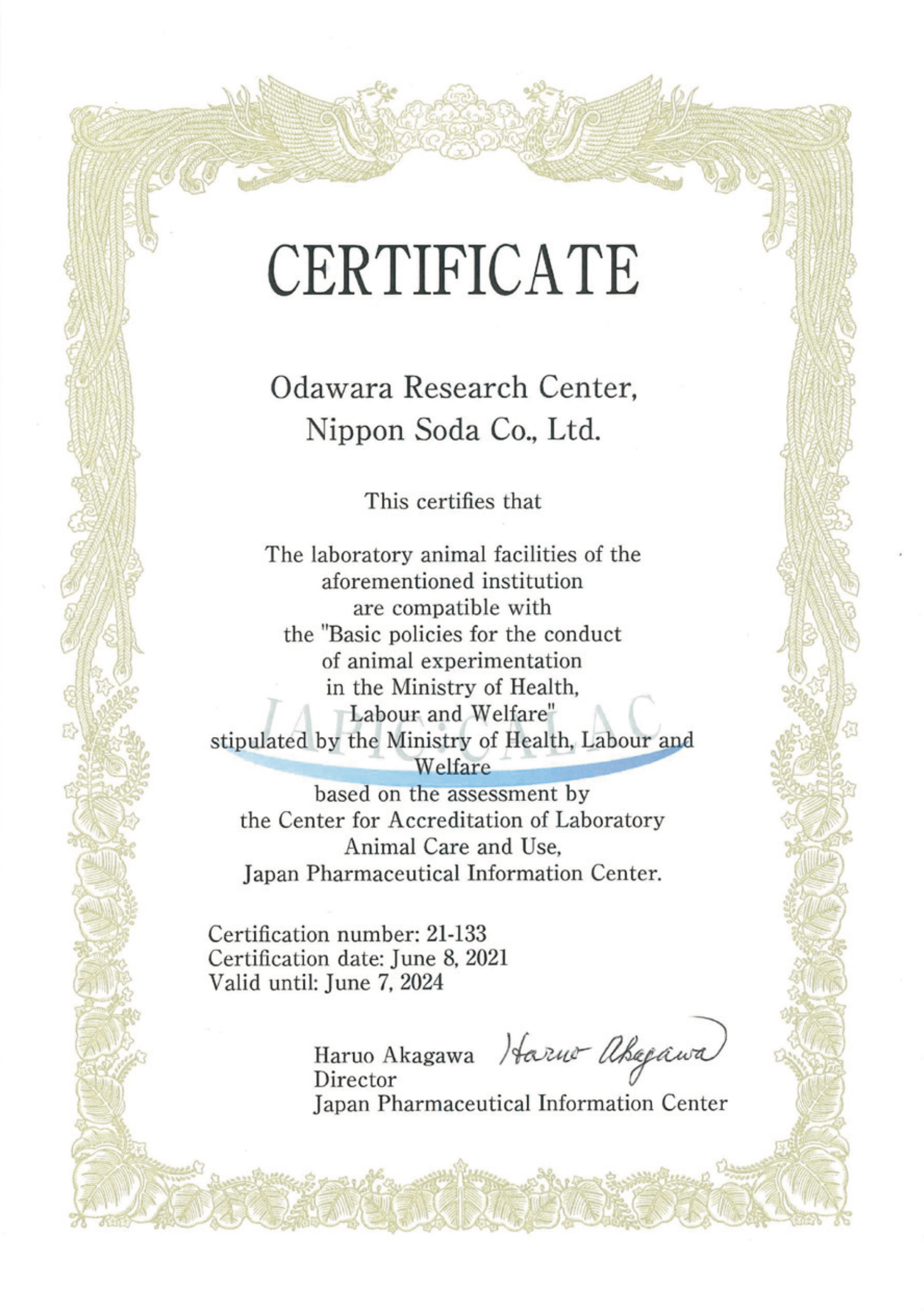Chemicals and Product Safety
The Nippon Soda Group takes into consideration the potential environmental, safety and health impacts related to the hazards and toxicity of chemical substances and products, complying with laws and regulations and international standards, while also complying with regulations based on social demands, so as to earn the trust of customers and society and in turn ensure sustainable business activities.
- Compliance with domestic laws and regulations, international standards, and treaties, etc., giving due consideration to the environmental, safety and health impacts related to the hazards and toxicity of chemical substances and products.
- Compliance with social restrictions that are not covered by law to maintain and ensure trust from customers and the general public.
- Specific measures to ensure the safety management of chemical substances, including activities and periodic educational programs regarding chemical and product safety.
Safety of Chemicals
Strengthening management of chemical substances using ExESS, a chemical substance control system
We are strengthening the management of chemical substances through the use of the chemical substance management system (ExESS),*1 which we use to create SDSs*2 and Yellow Cards. We prepare and revise SDSs and Yellow Cards to comply with revisions to laws in Japan and overseas. We also adopt GHS*3 for SDS and product labels for Europe, the United States, China, Taiwan, South Korea, Southeast Asia, Turkey, and other countries outside of Japan. In FY 2022, to transfer Japanese SDSs to the revised Japanese Industrial Standard (JIS) version, we conducted improvement work on ExESS, and briefed the personnel of each relevant worksite. Further, we completed transfer of Japanese SDSs to the revised JIS version by the revision deadline of May 24, 2022.
- *1 Developed by Lisam Systems Company (Belgium).
- *2 SDS (Safety Data Sheet) documents describing information on chemical substances, product names, suppliers, hazards, precautionary safety measures, emergency response, etc.
- *3 Globally Harmonized System of Classification and Labelling of Chemicals (GHS): A system for the international standardization of classification and labeling of chemicals, which was agreed upon by the United Nations Economic and Social Council. It is a system of international hazard classification standards and labeling methods (product labeling and SDS) for chemical hazards.
Regular training programs on chemical substance control
We provide employees who handle chemical substances with education on how to comply with Japanese and overseas laws and regulations regarding the management of chemicals. In FY 2022, programs were held online to prevent the spread of COVID-19.
Product Safety
Actions to comply with laws and regulations
The Nippon Soda Group takes actions to comply with domestic and overseas laws and regulations (including the EU REACH regulations*4) and conducts audits of poisonous and deleterious substances at sales offices and branches.
In FY 2022, programs were held online to prevent the spread of COVID-19.
- *4 REACH (Registration, Evaluation, Authorization and Restriction of Chemicals): European chemicals regulations. European regulations state that businesses that manufacture or import one ton or more of products per year are required to register the substances they handle and submit safety test data, and that substances for which data is not submitted (registered) cannot be sold.
Communication of safety information on chemicals
The Nippon Soda Group participates in GPS/JIPS*5 activities. We have prepared safety summary reports on four substances, including caustic soda and hydrochloric acid, which have been registered on the ICCA*6 portal page and made publicly available.
-
*5 GPS (Global Product Strategy): A voluntary industry initiative based on risk assessment and risk management with a global product strategy as the basic concept, taking into account the supply chain
JIPS (Japan Initiative of Product Stewardship): ICCA’s Product Stewardship (PS), an international initiative - *6 ICCA (International Council of Chemical Associations)
(Achievement levels ◎:≥ 90% ○:80-90% △:60-80% ╳: ≤ 60%)
| 1. Compliance with chemical-related laws and regulations: Target: Zero violations |
Achievement level ×:Three violations at Nippon Soda (Nihongi Plant: Improper labeling hazardous substance; Takaoka Plant: Partially missing measurement data from verification test for food additive product, Manufacture and use of stimulant material [phenylacetic acid]) |
|---|
With a target of compliance with chemical-related laws and regulations (zero violations), we will reinforce the management of chemical substances through new chemical substance management systems, make domestic and overseas SDS/product label revisions, and reinforce examination and management of products containing chemical substances. We will continue to provide regular training programs on chemical substance control, such as training for new/transferred employees and explanatory sessions on revisions of laws and regulations, as well as explanatory sessions on revisions to relevant laws and regulations of foreign countries.
Consideration in Animal Experiments
The Odawara Research Center has formulated its own regulations for animal experimentation and other relevant standards based on the Act on Welfare and Management of Animals, the Ministry of the Environment’s Standards Relating to the Care and Keeping and Reducing Pain of Laboratory Animals, the Ministry of Agriculture, Forestry and Fisheries’ The Basic Policy on Animal Experimentation Performed at Research Institutions, and the Science Council of Japan’s Guidelines for Proper Conduct of Animal Experiments. These activities are validated by an external organization (the Japan Pharmaceutical Information Center*7) and the facility was certified in June 2018 as a facility that conducts animal experiments in a proper manner (certification was renewed in June 2021).
- *7 The Japan Pharmaceutical Information Center (JAPIC) has taken on certified businesses from the Japan Health Sciences Foundation, which was disbanded in March 2021.



